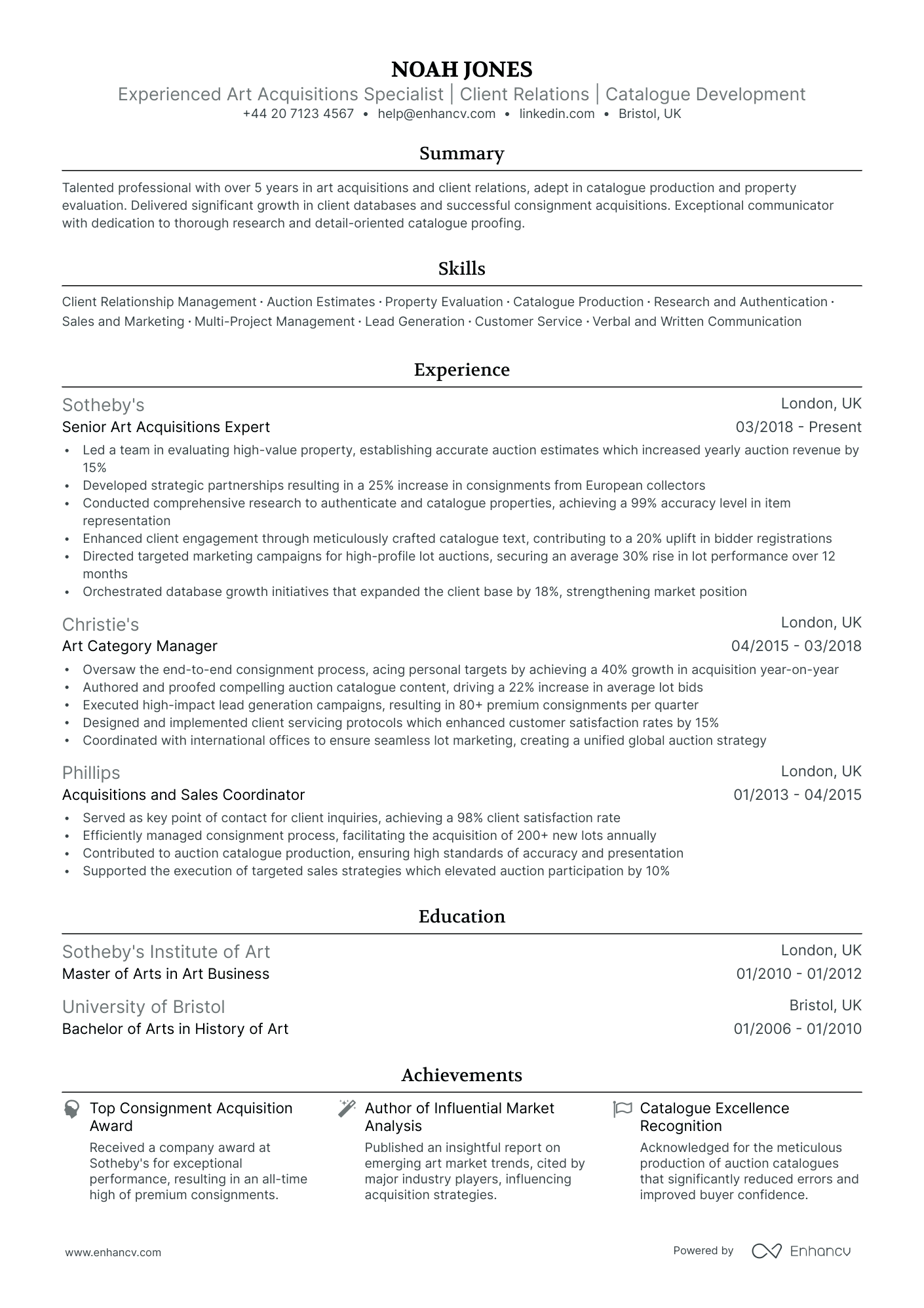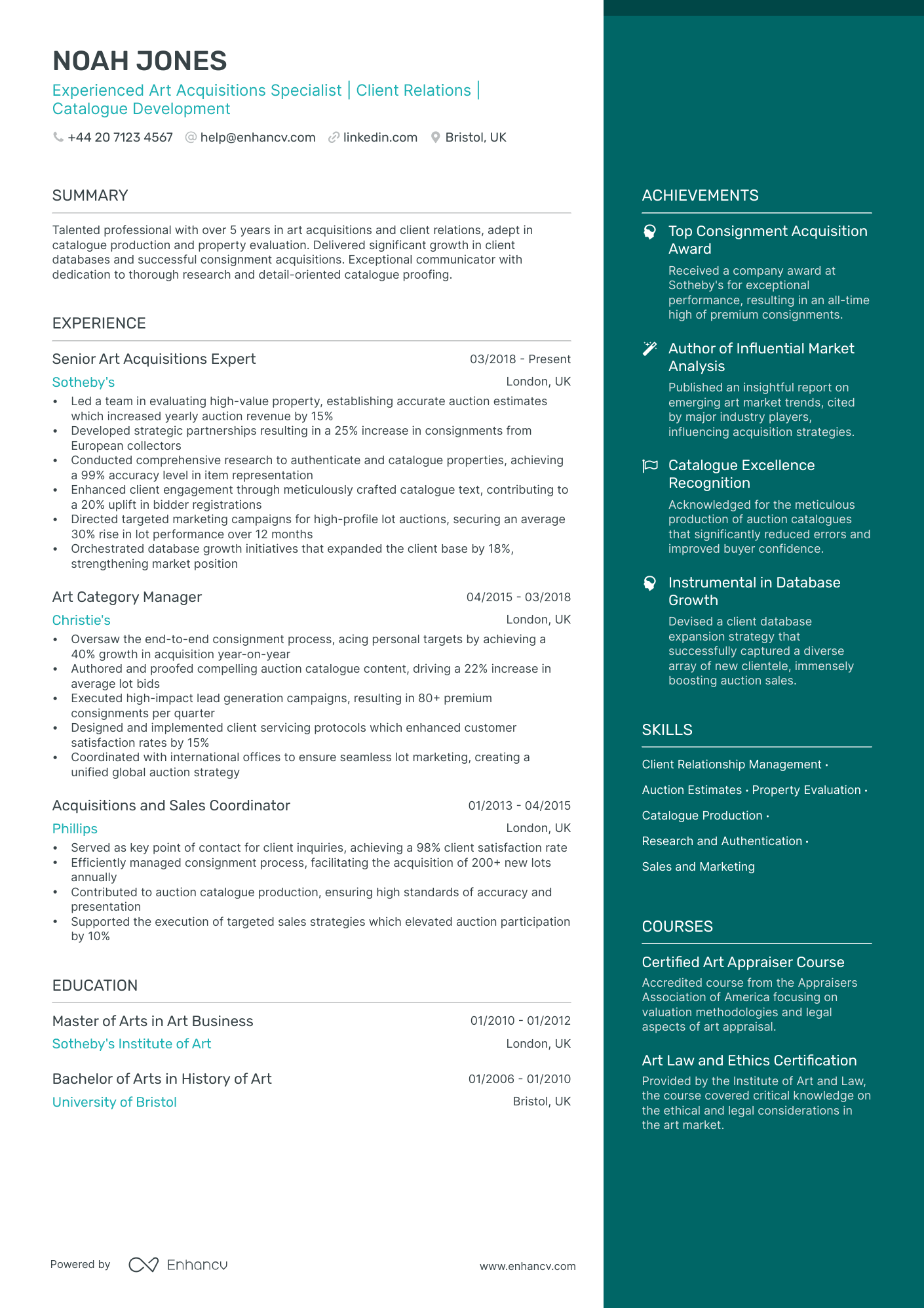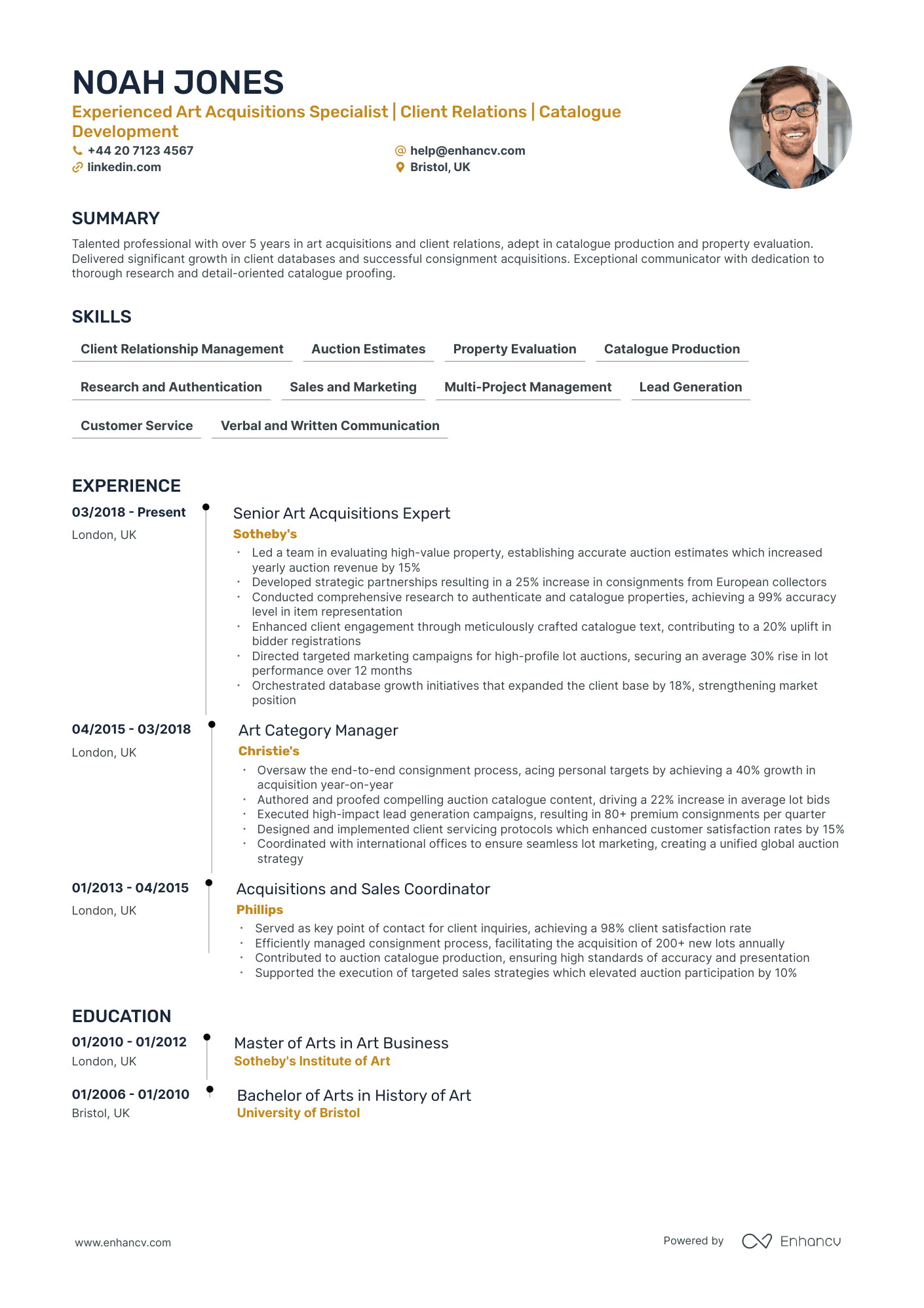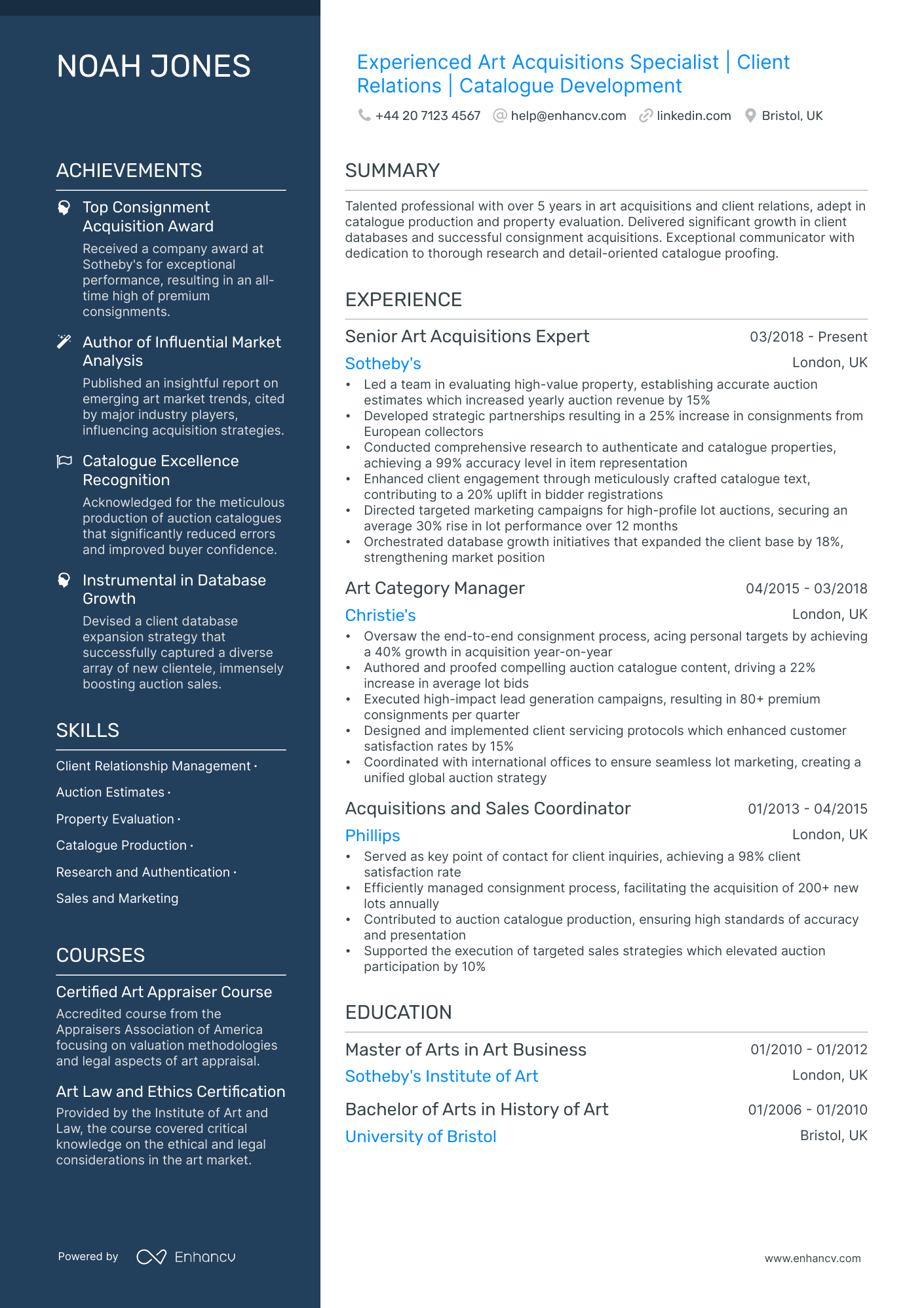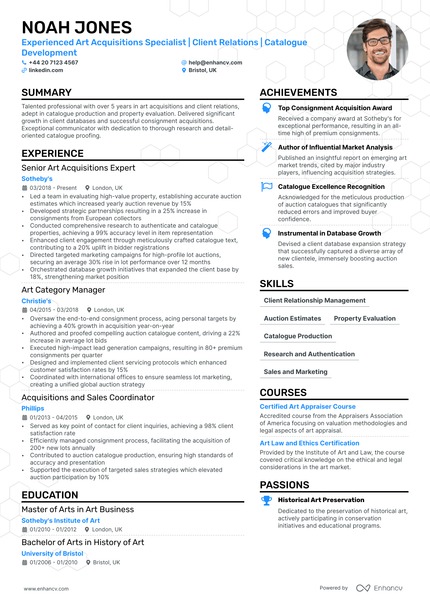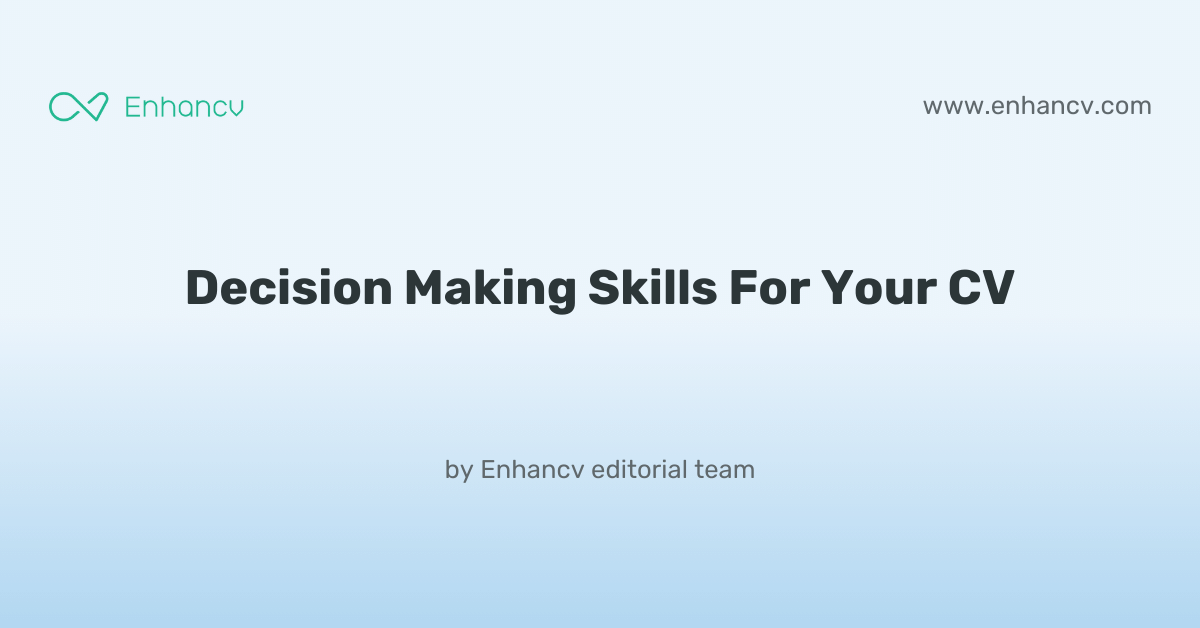Crafting a curriculum vitae that effectively encapsulates your leadership experience and vision can be a perplexing challenge for any director. By following our comprehensive guide, you'll be equipped with strategic insights and practical tips to present your professional narrative compellingly.
- Create an attention-grabbing header that integrates keywords and includes all vital information;
- Add strong action verbs and skills in your experience section, and get inspired by real-world professionals;
- List your education and relevant certification to fill in the gaps in your career history;
- Integrate both hard and soft skills all through your CV.
Discover more industry-specific guides to help you apply for any role in the links below:
Structuring your director CV layout: four factors to keep in mind
There are plenty of best practices out there for your CV layout and design. At the end of the day, a clear format and concise CV message should be your top priority. Use your CV design to enhance separate sections, bringing them to the forefront of recruiters' attention. At the same time, you can write content that:- Follows the reverse chronological order in the experience section by first listing your most recent jobs;
- Incorporates your contact information in the header, but do skip out on the CV photo for roles in the UK;
- Is spotlighted in the most important sections of your CV, e.g. the summary or objective, experience, education, etc. to show just how you meet the job requirements;
- Is no longer than two-pages. Often, the one-page format can be optimal for your director CV.
Before submitting your CV, you may wonder whether to export it in Doc or PDF. With the PDF format, your information and layout stay intact. This is quite useful when your CV is assessed by the Applicant Tracker System (or the ATS) . The ATS is a software that scans your profile for all relevant information and can easily understand latest study on the ATS , which looks at your CV columns, design, and so much more.
PRO TIP
Use bold or italics sparingly to draw attention to key points, such as job titles, company names, or significant achievements. Overusing these formatting options can dilute their impact.
The top sections on a director CV
- Executive Summary showcases leadership philosophy and vision.
- Professional Experience lists impactful roles and achievements.
- Key Directing Projects highlight successful projects or productions.
- Leadership Skills detail abilities in managing teams and projects.
- Education and Training show relevant academic and industry credentials.
What recruiters value on your CV:
- Highlight leadership experience by detailing your strategic decision-making capabilities and successful project or departmental outcomes under your direction, thereby showcasing your ability to operate at a high level within an organisation.
- Emphasise your ability to manage cross-functional teams and complex organisational structures, reflecting on how you've successfully navigated and integrated the different aspects of a business.
- Include metrics-driven achievements that demonstrate your impact on the company's growth, profitability, or market position, providing concrete evidence of your leadership effectiveness.
- Discuss your experience in stakeholder management, illustrating how you excel in communicating with and presenting to boards, investors, and external partners to drive the company's objectives forward.
- Focus on your strategic vision and innovation, presenting instances where you have identified opportunities for growth or transformation, thereby signalling your forward-thinking approach which is imperative for director-level roles.
Recommended reads:
How to present your contact details and job keywords in your director CV header
Located at the top of your director CV, the header presents recruiters with your key personal information, headline, and professional photo. When creating your CV header, include your:
- Contact details - avoid listing your work email or telephone number and, also, email addresses that sound unprofessional (e.g. koolKittyCat$3@gmail.com is definitely a big no);
- Headline - it should be relevant, concise, and specific to the role you're applying for, integrating keywords and action verbs;
- Photo - instead of including a photograph from your family reunion, select one that shows you in a more professional light. It's also good to note that in some countries (e.g. the UK and US), it's best to avoid photos on your CV as they may serve as bias.
What do other industry professionals include in their CV header? Make sure to check out the next bit of your guide to see real-life examples:
Examples of good CV headlines for director:
- Director of Operations | Lean Six Sigma Black Belt | Strategic Planning Expert | 15+ Years of Progression
- Creative Director | Brand Development Specialist | Award-Winning Campaigns | Masters in Design | Over 20 Years' Experience
- IT Director | Cybersecurity Visionary | Cloud Solutions Architect | Certified ITIL Expert | 18 Years in Tech Leadership
- Finance Director | Chartered Accountant | Risk Management Analyst | FTSE 100 Experience | FCA Compliance | 22 Years
- Sales Director | International Market Expansion | B2B Sales Guru | MBA | Proven Revenue Growth | 17-Year Career
- HR Director | Organisational Psychologist | CIPD Qualified | Diversity and Inclusion Champion | 15+ Years Senior-Level Insight
Catching recruiters' attention with your director CV summary or objective
Located closer to the top of your CV, both the summary and objective are no more than five sentences long and serve as an introduction to your experience. What is more, you could use either to entice recruiters to read on. Select the:
- Summary, if you happen to have plenty of relevant experience. Feature your most impressive accomplishments and up to three skills that are relevant to the job you're applying for;
- Objective, if you're just starting your career off. Provide your career goals and answer how you see the role you are applying for will match your professional growth.
Judging which one you need to add to your director CV may at times seem difficult. That’s why you need to check out how professionals, with similar to your experience, have written their summary or objective, in the examples below:
CV summaries for a director job:
- Seasoned marketing director with over 15 years of experience in spearheading successful marketing campaigns, specifically in the tech sector. Proficient in digital marketing strategies with a robust track record of increasing market share by 35% for a leading SaaS company.
- Dynamic financial director with 18 years of comprehensive experience managing multimillion-dollar budgets and financial planning in the manufacturing industry. Instrumental in delivering a 25% increase in profitability through strategic cost reduction and revenue enhancement initiatives.
- Accomplished project manager with a decade of experience in construction seeking to transition into a director's position, bringing extensive leadership skills and a proven history of reducing project timelines by 20%, while consistently delivering under budget.
- Expert educator with 22 years leading academic departments now pivoting to corporate training, aiming to apply my strong background in curriculum design and talent development, which saw a 40% increase in student achievement rates to a director-level role in a corporate setting.
- Aspiring to leverage my strategic thinking and fresh perspective to embark on a new challenge as a director. Despite having no direct background in this field, I am committed to utilizing my analytical skills and unwavering dedication to drive growth and exceed performance benchmarks.
- Determined to integrate my comprehensive background in customer service into a directorial capacity, where I can contribute my exceptional communication and team management skills. Eager to cultivate a collaborative and result-driven environment notwithstanding my nascent experience in this specific domain.
The best formula for your director CV experience section
The CV experience section is the space where many candidates go wrong by merely listing their work history and duties. Don't do that. Instead, use the job description to better understand what matters most for the role and integrate these keywords across your CV. Thus, you should focus on:
- showcasing your accomplishments to hint that you're results-oriented;
- highlighting your skill set by integrating job keywords, technologies, and transferrable skills in your experience bullets;
- listing your roles in reverse chronological order, starting with the latest and most senior, to hint at how you have grown your career;
- featuring metrics, in the form of percentage, numbers, etc. to make your success more tangible.
When writing each experience bullet, start with a strong, actionable verb, then follow it up with a skill, accomplishment, or metric. Use these professional examples to perfect your CV experience section:
Best practices for your CV's work experience section
- Strategically led a cross-functional team of over 200 employees, driving a 25% increase in productivity and achieving top-tier industry benchmarks for performance.
- Successfully negotiated multimillion-pound contracts with key industry players, expanding market share by 15% and enhancing the organisation's competitive edge.
- Directed a large-scale digital transformation project, resulting in a 40% reduction in operational costs and significantly improved data-driven decision-making processes.
- Implemented rigorous financial controls and budgeting strategies, ensuring company growth whilst maintaining a lean cost structure and a sustained 10% profit increase year-on-year.
- Championed the development and launch of three new product lines, which diversified the company's portfolio and resulted in a 30% revenue increase.
- Enhanced the company's corporate governance framework, which improved compliance with industry regulations and reduced legal risks by 20%.
- Forged successful partnerships with international stakeholders, fostering global expansion and translating to a 50% boost in the international revenue stream.
- Led crisis management initiatives that protected company assets and brand reputation during critical times, mitigating potential losses by up to 60%.
- Invested in talent development programmes that enhanced leadership capabilities across the organisation, leading to a 35% decrease in staff turnover and the cultivation of a high-performing executive team.
- Led a complete organisational restructuring process for a multinational tech company, which improved operational efficiency by 27%.
- Directly managed a budget of £4M, effectively reallocating resources to increase return on investment for new product development.
- Oversaw the launch of a groundbreaking SaaS platform, which acquired over 100,000 users within the first year.
- Orchestrated a strategic partnership with another industry leader, leading to a joint venture that captured an additional 15% market share.
- Directed a cross-functional team of 200+ employees through a period of significant digital transformation, maintaining team morale and productivity.
- Spearheaded a corporate sustainability programme that reduced the company's carbon footprint by 35% over five years.
- Masterminded the successful turnaround of a struggling mobile division by introducing a new product line, which increased revenues by £50M.
- Cultivated and led a high-performance team culture, leading to a 40% reduction in staff turnover in two years.
- Implemented a data-driven decision-making framework that improved project delivery times by 22%.
- Pioneered an industry-leading AI-driven analytics tool, enhancing the company's data capabilities and creating new revenue streams.
- Negotiated lucrative contracts with five major industry partners, which increased the company's B2B revenue by 30%.
- Championed a culture of continuous learning and development, implementing upskilling programs that enhanced team productivity.
- Launched a multimillion-pound advertising campaign that elevated brand recognition in the European market by 48%.
- Drove the expansion into three new international markets, resulting in a consolidated revenue increase of £80M over the duration of the role.
- Executed a company-wide cost optimisation strategy, which saved £12M annually while maintaining service quality.
- Transformed the company’s research and development approach, introducing agile methodologies that accelerated product time-to-market by 50%.
- Managed corporate acquisitions valued at over £200M, successfully integrating new assets and talent into the company's portfolio.
- Enhanced the customer service model, improving satisfaction scores by 25% through an initiative that leveraged advanced CRM tools.
- Implemented cutting-edge cybersecurity measures which decreased the incidence of breaches by 60% and protected client data.
- Conceptualised and rolled out a digital transformation strategy that modernised legacy systems, boosting productivity by 38%.
- Cultivated strategic alliances with tech giants, securing preferential pricing and technology access that gave the firm a competitive edge.
- Orchestrated the adoption of a cloud infrastructure that enhanced the firm's scalability, supporting a tripling of customer base size.
- Implemented a company-wide remote working system, which led to a 20% increase in employee productivity and job satisfaction.
- Developed and executed a new go-to-market strategy for our fintech products, resulting in a 25% year-on-year growth in this sector.
Swapping your professional experience (when you have none) with skills and more
Never underestimate the importance of relevancе when it comes to your director CV. Even if you don't happen to have much or any standard (full-time contract) professional experience, this doesn't mean you shouldn't apply for the role. Instead of a bespoke CV experience section:
- Showcase more prominently any internships, part-time roles, and volunteer experience that are applicable to the role and have taught you job-crucial skills;
- Feature a strengths or achievements section with your transferrable skills or talents you've obtained thanks to your work or life experience;
- Write an objective statement that clearly outlines your values as a candidate and defines your career ambitions;
- List your education or certificates that match the job profile closer to the top of your CV.
Recommended reads:
PRO TIP
If you have experience in diverse fields, highlight how this has broadened your perspective and skill set, making you a more versatile candidate.
Hard skills and soft skills to showcase your unique skill set on your director CV
Did you know that your CV will mostly likely be assessed by recruiters based on skill alignment? And that means that the way you feature your key skills across different CV sections will play a crucial role in landing you that first interview. We recommend you add your:
- technical capabilities or hard skills in your CV experience, certificates, projects, etc. Use your past accomplishments to prove your technical capabilities. List up to a dozen different software or hardware in your dedicated skills section to match the job keywords;
- personal and communication skills or soft skills in your CV strengths, achievements, summary/ objective, etc. Soft skills are a bit more difficult to prove. How do you define your aptitude in active listening? So, instead of just listing the skill name, include a tangible metric to show your success.
On a final note, when you're in a hurry to create your profile, you may misspell a particular technology or soft skill. That's why we suggest you copy and paste the particular skill name (or keyword), directly from the job advert. This would also help you to pass any initial Applicant Tracker System (ATS) tests.
Top skills for your director CV:
Strategic Planning
Financial Management
Project Management
Data Analysis
Marketing Expertise
Human Resources Management
Change Management
Process Improvement
Regulatory Compliance
Operational Oversight
Leadership
Communication
Problem-Solving
Decision-Making
Adaptability
Innovation
Negotiation
Teamwork
Motivational Skills
Interpersonal Skills
PRO TIP
Use mini case studies or success stories in your CV to demonstrate how your skills have positively impacted previous roles or projects.
Education and more professional qualifications to include in your director CV
If you want to showcase to recruiters that you're further qualified for the role, ensure you've included your relevant university diplomas. Within your education section:
- Describe your degree with your university name(-s) and start-graduation dates;
- List any awards you've received, if you deem they would be impressive or are relevant to the industry;
- Include your projects and publications, if you need to further showcase how you've used your technical know-how;
- Avoid listing your A-level marks, as your potential employers care to learn more about your university background.
Apart from your higher education, ensure that you've curated your relevant certificates or courses by listing the:
- name of the certificate or course;
- name of the institution within which you received your training;
- the date(-s) when you obtained your accreditation.
In the next section, discover some of the most relevant certificates for your director CV:
PRO TIP
If you have received professional endorsements or recommendations for certain skills, especially on platforms like LinkedIn, mention these to add credibility.
Recommended reads:
Key takeaways
Write your professional director CV by studying and understanding what the role expectations are. You should next:
- Focus on tailoring your content to answer specific requirements by integrating advert keywords through various CV sections;
- Balance your technical know-how with your personal skills to showcase what the unique value would be of working with you;
- Ensure your CV grammar and spelling (especially of your key information and contact details) is correct;
- Write a CV summary, if your experience is relevant, and an objective, if your career ambitions are more impressive;
- Use active language by including strong, action verbs across your experience, summary/objective, achievements sections.
